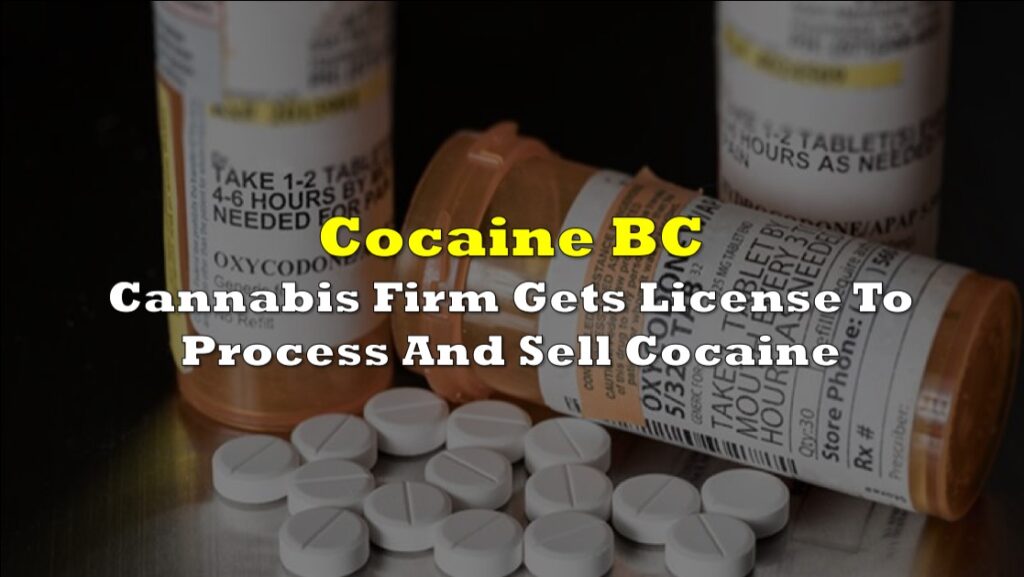FULL DISCLOSURE: This content is sponsored by PharmaDrug Inc.
Switzerland is currently reevaluating its stance on drug policy as reports emerge of a groundbreaking proposal to legalize the sale of cocaine for recreational use in the capital city of Bern. This comes in response to mounting evidence suggesting that the country’s longstanding “war on drugs” has proven ineffective.
According to reports in December, Bern’s Parliament has expressed support for a pilot scheme aimed at allowing the legal sale of cocaine. This move, described as radical, signifies a departure from traditional approaches to drug control that have been largely unsuccessful.
The proposal, which has garnered attention worldwide, is still in its early stages and faces hurdles such as opposition from the city government and the need for changes in national law, as reported by Reuters. However, proponents argue that it represents a necessary shift in policy.
Eva Chen, a member of the Bern council from the Alternative Left Party and a co-sponsor of the proposal, emphasized the failure of the current approach to drug regulation.
“The war on drugs has failed, and we have to look at new ideas…Control and legalization can do better than mere repression,” Chen stated.
Switzerland’s consideration of legalizing cocaine comes amidst rising concerns over drug use in the country. Recent studies have indicated high rates of cocaine consumption, with prices for the drug dropping significantly in recent years. Frank Zobel, deputy director at Addiction Switzerland, highlighted the accessibility of cocaine, noting its affordability compared to other commodities.
“You can get a dose of cocaine for about 10 francs these days, not much more than the price for a beer,” Zobel said.
The move by Switzerland reflects a broader trend in drug policy reform worldwide. In the United States, for example, the state of Oregon decriminalized possession of small amounts of cocaine in 2021, opting for a more treatment-oriented approach. Similarly, several European countries, including Spain, Italy and Portugal, have moved towards decriminalization and don’t impose prison sentences anymore for possession of drugs including cocaine, though none have gone as far as the proposal under consideration in Bern.
“Safest, least damaging way”
In Switzerland’s case, parliament would need to amend existing laws that prohibit the recreational use of cocaine. This process could take years, although accelerated action may be possible if current cannabis schemes, where the drug is sold at pharmacies, demonstrate positive outcomes, political experts suggest.
While some experts remain divided on the issue, others like Thilo Beck from Arud Zentrum for Addiction Medicine argues for a more pragmatic approach. Beck acknowledges the inherent risks of cocaine but suggests that a shift towards a more “grown-up” policy is necessary.
“Cocaine isn’t healthy – but the reality is that people use it,” said Beck. “We can’t change that, so we should try to ensure people use it in the safest, least damaging way.”
In Oregon, Measure 110, approved by 58% of Oregon voters three years ago, was hailed as a progressive approach to combat addiction by shifting focus towards treatment rather than punishment. Alongside decriminalization, the measure redirected a portion of the state’s cannabis tax revenue towards funding addiction treatment and recovery services.
Despite its initial support, Measure 110 has faced criticism amidst a surge in opioid-related deaths, particularly attributed to the proliferation of fentanyl. This has prompted calls for reassessment from both Democratic and Republican lawmakers, who are now considering potential revisions to the law as Oregon grapples with its ongoing opioid crisis.
Portugal decriminalized the personal possession of all narcotics in 2001 as part of a broader governmental shift toward a health-led strategy. Possession is now considered an administrative crime, not a criminal offense punishable by imprisonment.
Since Portugal stopped criminalizing drugs, the number of people imprisoned for drug offenses has dropped from over 40% to 15.7% in 2019. The majority of this drop occurred over the first decade after decriminalization.
On the other hand, Australia has the highest per capita use of cocaine globally, with Sydney, New South Wales, leading in consumption.
In Sydney, drug users face the justice system rather than being referred to health services. The lack of a decriminalization policy in New South Wales, like in many places worldwide, is criticized for burdening courts and benefiting traffickers.
However, the Australian Capital Territory, including Canberra, decriminalized small quantities of hard drugs in October 2023, a first in the country. Australia also legalized the clinical prescription of MDMA and psilocybin for certain mental health disorders, raising questions about potential future changes in their approach to cocaine.
Mexico, a land beset by narcos, has no penalty for the carrying of small amounts of cocaine.
In Colombia, a country known for its extensive war on drugs, a groundbreaking initiative was recently launched aimed at transforming Colombia’s drug policy. Led by the Minister of Agriculture, Jhenifer Mojica, the event marked the introduction of the ‘Alliance for the Implementation of the Uses of the Coca Leaf in the Transition to Licitan Economies’.
“We came from an anti-drug fight focused on attacking the bush and obsessed with measuring attacked crops. There is a burden of fear and distrust against change,” Mojica stated, underscoring the need for a departure from traditional approaches.
Highlighting the failures of historic drug policies, Mojica stressed the adverse environmental and social impacts, including deforestation and public health crises. “The problem of illicit drugs is a public health issue that has been transferred to indigenous communities,” she remarked, acknowledging the urgent need for change.
Central to the new policy is the utilization of coca leaf derivatives for licit purposes, such as organic fertilizers. Mojica emphasized community involvement in decision-making processes, indicating a departure from top-down approaches.
“Health issue, not a criminal issue”
In a situation much closer to home, British Columbia became the first province in Canada to decriminalize the personal use of heroin, meth, ecstasy, and cocaine last year. The decision, known as the “Section 56, Exemption,” will be in force for three years until January 31, 2026, which entails possessing small amounts of certain illicit drugs in British Columbia will no longer be a criminal offense for individuals aged 18 and above.
Under the exemption, individuals can legally possess up to 2.5 grams of cocaine (crack and powder), methamphetamine, MDMA, and opioids (including heroin, fentanyl, and morphine). The pilot aims to address the ongoing overdose crisis in B.C., with fentanyl and its analogues contributing to nearly 86% of drug toxicity deaths from 2019 to 2022.
“Given our understanding that substance use is a health issue, not a criminal issue,” said Jennifer Whiteside, British Columbia’s minister of mental health and addictions, at the time of the announcement. “We need to take this further step to address the shame and stigma.”
Toronto has made a similar request to Ottawa, requesting an exception from Section 51. Unlike BC, however, Toronto has not specified a threshold and has asked for all medications to be exempt.
“Safe supply is needed”
In 2019, the Canadian Association of People who Use Drugs released a comprehensive concept document outlining the principles and strategies behind “safe supply” programs. This initiative aims to provide legal and regulated access to drugs with mind-altering properties, traditionally obtained through illicit markets, in order to reduce harm and improve public health.
Safe supply refers to the provision of drugs such as opioids, stimulants, hallucinogens, and marijuana in a legal and regulated manner. The document highlights the need for safe supply strategies to balance minimizing drug-related risks while ensuring accessibility to undercut the illicit market.
Key considerations outlined in the document include the importance of offering drugs that closely resemble those sought by clients, developing programs in partnership with people who use drugs, and avoiding overly medicalized or clinical environments that may deter participation. The document also stresses the need to respect individuals’ desire for euphoria, rather than solely focusing on maintenance.
Dispensing models proposed in the document range from supervised administration by health professionals to self-administration in take-home doses. These models aim to provide flexibility and accessibility while ensuring safety and oversight.
Furthermore, the document explores examples of safe supply programs, particularly focusing on stimulants such as cocaine. While acknowledging the challenges in finding suitable replacements for cocaine, the report suggests innovative approaches, including administration in oral forms like pills, chewing gum, tea, or wine.
“What seems clear is that stimulant replacement treatment needs to include options that resemble what people are seeking in the illicit market. We must find ways to provide regulated cocaine, to those who seek cocaine,” the report said.
Biosynthetic cocaine
In this light, efforts made by firms like PharmaDrug (CSE: PHRX) aim to ensure the movement of the industry towards the use of safe supply programs. The pharmaceutical company has recently announced the commencement of a groundbreaking project to develop a novel manufacturing method for commercial-scale production of cocaine to support safe supply programs. The company aims to address the lack of a reliable supply chain for cocaine, which causes significant harm and costs to society.
The innovative biosynthetic method, for which PharmaDrug has filed a patent, utilizes advanced chemistry techniques to enable cost-effective and efficient manufacturing of pharmaceutical-grade cocaine at scale. This development marks a significant step in providing a clinically manufactured drug product for safe supply programs, potentially transforming the supply chain and offering new revenue opportunities through global partnerships and licensing agreements.
“We have seen the proliferation of safe supply programs in both Canada and around the world. While opioid addiction is a serious problem, there exists a supply chain that provides both natural and synthetic opioid products for those programs. Cocaine, however, is the illegal drug that causes the most cost and harm to society barring opioids according to the Canadian Centre for Substance Use and Addiction, causing $4.2 billion in harm in Canada annually – but there is no supply chain to alleviate these harms,” said PharmaDrug CEO Robert Steen.
PharmaDrug has identified a laboratory with the necessary expertise and licensing to advance the development of this novel process. The company intends to proceed with development at an accelerated pace to meet the urgent need for a reliable supply of pharmaceutical-grade cocaine.
While emphasizing the company’s dedication to harm reduction, Steen underscored the importance of providing safe alternatives for substance abuse, particularly amid concerns about contaminated street drugs laced with lethal substances like fentanyl. He emphasized that while rehabilitation remains a priority, it may not be immediately achievable for all individuals, necessitating harm reduction measures.
PharmaDrug believes that the development of biosynthetic versions of substances is essential for establishing a regulated pharmaceutical supply chain. The company’s innovative process could potentially enable the cost-effective and efficient production of cocaine as a pharmaceutical-grade drug, ensuring a safer supply for individuals struggling with addiction.
Information for this briefing was found via Reuters, Live Mint, AP News, CBC, Bloomberg, Foreignpolicy.com, and the sources mentioned. The author has no securities or affiliations related to this organization. Not a recommendation to buy or sell. Always do additional research and consult a professional before purchasing a security. The author holds no licenses.
FULL DISCLOSURE: PharmaDrug is a client of Canacom Group, the parent company of The Deep Dive. Canacom Group is currently long the equity of PharmaDrug. The author has been compensated to cover PharmaDrug on The Deep Dive, with The Deep Dive having full editorial control. Not a recommendation to buy or sell. Always do additional research and consult a professional before purchasing a security.









